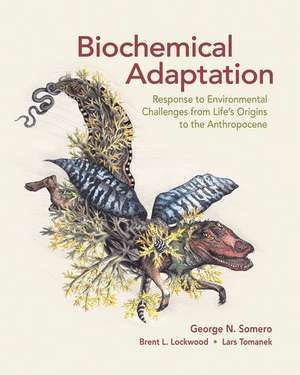Biochemical Adaptation: Response to Environmental Challenges from Life's Origins to the Anthropocene
Autor George N. Somero, Brent L. Lockwood, Lars Tomaneken Limba Engleză Hardback – feb 2017
Preț: 931.98 lei
Preț vechi: 1083.69 lei
-14% Nou
Puncte Express: 1398
Preț estimativ în valută:
178.36€ • 185.52$ • 147.24£
178.36€ • 185.52$ • 147.24£
Carte disponibilă
Livrare economică 13-19 martie
Preluare comenzi: 021 569.72.76
Specificații
ISBN-13: 9781605355641
ISBN-10: 160535564X
Pagini: 572
Dimensiuni: 259 x 206 x 31 mm
Greutate: 1.52 kg
Editura: Oxford University Press
Colecția OUP USA
Locul publicării:New York, United States
ISBN-10: 160535564X
Pagini: 572
Dimensiuni: 259 x 206 x 31 mm
Greutate: 1.52 kg
Editura: Oxford University Press
Colecția OUP USA
Locul publicării:New York, United States
Notă biografică
George N. Somero is David and Lucile Packard Emeritus Professor of Marine Sciences at the Hopkins Marine Station of Stanford University. After receiving a Bachelor's Degree in Biology from Carleton College, he completed his Ph.D. in Biological Sciences at Stanford (with Dr. Arthur Giese), and postdoctoral studies with Dr. Peter Hochachka at the University of British Columbia. Dr. Somero coauthored three books on biochemical adaptation with Dr. Hochachka, and coedited (with Charles B. Osmond and Carla L. Bolis) Water and Life, a volume on water-solute relationships. His major research interests focus on the effects of abiotic environmental factors (especially temperature, salinity, oxygen availability, and hydrostatic pressure) on biochemical systems.Brent L. Lockwood is Assistant Professor of Biology at the University of Vermont. He received Bachelor's Degrees in Biology and Anthropology from the University of California, San Diego and completed his Ph.D. in Biological Sciences in the lab of Dr. George Somero at Stanford University. Dr. Lockwood was an NIH postdoctoral fellow in the lab of Dr. Kristi Montooth at Indiana University. His lab works at the interface of physiology and evolutionary biology to elucidate the mechanisms that constrain or facilitate adaptation to environmental change.Lars Tomanek is Associate Professor of Department of Biological Sciences at California Polytechnic State University. He received his Bachelor's and Master's Degrees in Biology from the University of Konstanz (Germany). He completed his Ph.D. with Dr. George Somero at Oregon State University, and he did postdoctoral work with Dr. Somero at Stanford University and Dr. Dietmar Kültz at the University of California, Davis. Working mainly with intertidal invertebrates, he and his students integrate across levels of biological organization, from the subcellular to the whole-organism, to study physiological responses to temperature, osmotic, pH, hypoxic, heavy metal, and endocrine stressors.
